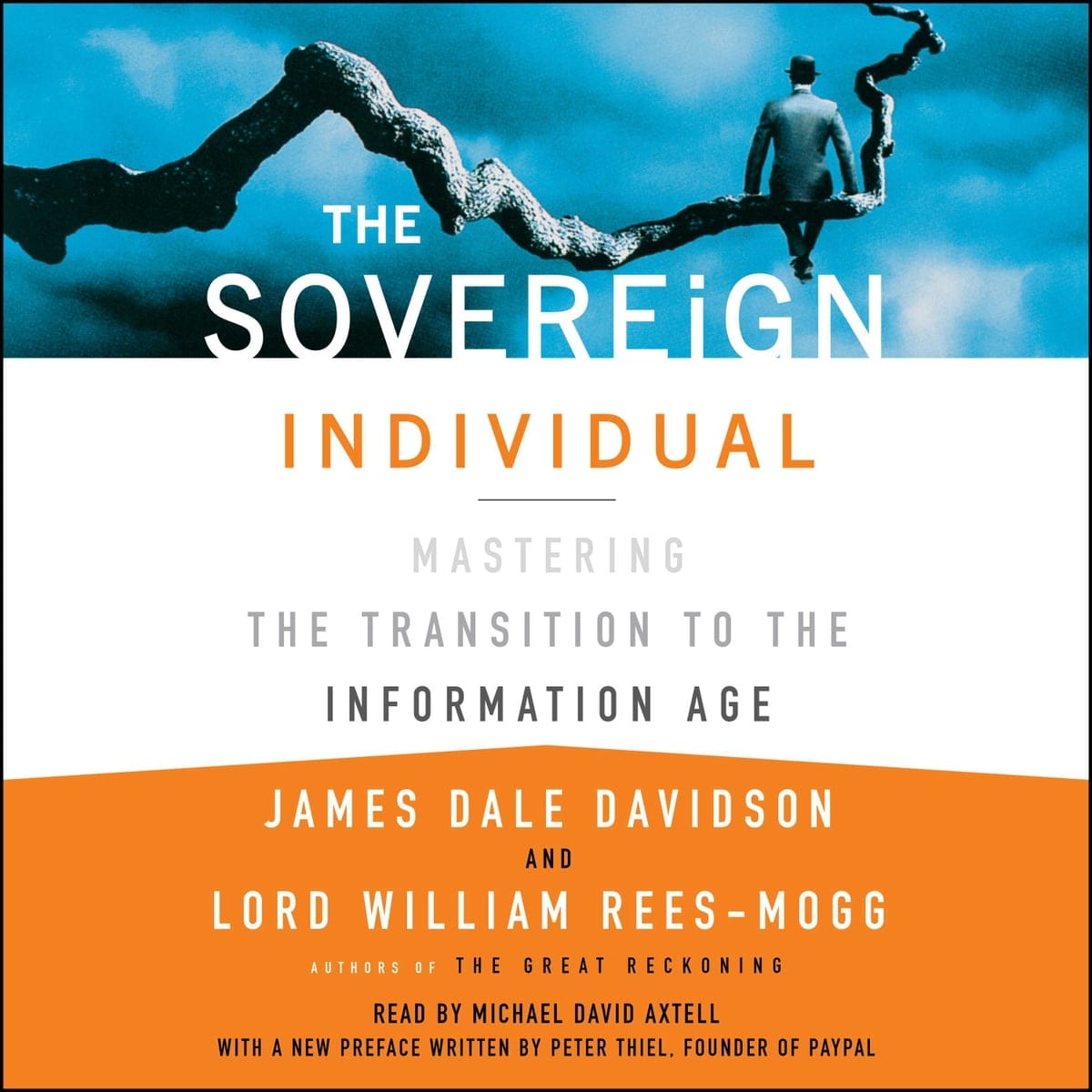The Sovereign Individual - Mastering the Transition to the Information Age

The Sovereign Individual: Mastering the Transition to the Information Age, authored by James Dale Davidson and Lord William Rees-Mogg, is a seminal work published in 1997 that explores the profound transformations anticipated in the socio-economic landscape as humanity transitions from industrialism to an information-based society. The authors, both seasoned analysts of political and economic trends, argue that this shift will fundamentally alter the nature of governance, individual autonomy, and the global economy.
The book is structured around the premise that human history can be categorised into four economic stages: foraging, farming, industrialism, and finally, the emerging information age. Davidson and Rees-Mogg assert that the information age will not only liberate individuals from traditional state controls but also lead to the fragmentation of nation-states into smaller, more agile entities they term "micro-sovereignties."
This review will focus particularly on the insights from Chapters 10 and 11, which delve into the implications of this transition.
Key Concepts and Themes
The authors present a compelling argument that the advent of information technology will lead to a significant reduction in the power of nation-states. As individuals gain greater control over their financial and personal affairs through technology, traditional government structures will struggle to maintain their relevance and authority. The book posits that the primary function of government—providing security—will be challenged as private entities and individuals find new ways to protect their interests.
Chapter 10: The Rise of Cyber Sovereignties
Chapter 10 explores the emergence of cyber-sovereignties, entities that exist largely in the digital realm and operate without the constraints of physical geography. The authors argue that as individuals increasingly conduct transactions online, the need for traditional state oversight diminishes. This chapter highlights several key points:
- Decentralisation of Power: The authors predict a shift towards decentralised governance structures, where power is distributed among various micro-sovereignties rather than centralised in nation-states. This decentralization will allow for greater competition among jurisdictions, as individuals will choose to domicile their economic activities in areas that offer the best services at the lowest costs.
- Erosion of Traditional Governance: The authors contend that the traditional roles of government will be undermined as technology diminishes the returns to violence and coercion. With the rise of digital currencies and online transactions, individuals will be able to protect their assets from predatory taxation and government overreach.
- Emergence of New Social Contracts: As the nation-state's power wanes, new forms of social contracts will emerge, based on voluntary agreements between individuals and micro-sovereignties. These contracts will prioritize individual rights and freedoms over collective governance, leading to a more liberated society.
Chapter 11: Transitional Violence and the Future of Governance
Chapter 11 addresses the turbulent transition from established nation-states to these new micro-sovereignties. The authors warn that this shift will not be without conflict. They outline several critical points:
- Increased Violence During Transition: The authors anticipate a rise in crime and violence as the structures of traditional governance collapse. With the decline of state authority, law enforcement may weaken, leading to a power vacuum that could be filled by criminal organizations or violent groups.
- Economic Dislocation: The transition will likely result in significant economic upheaval. Many individuals, particularly those in low-skilled jobs, may find themselves displaced as technology replaces traditional roles. This economic dislocation could lead to social unrest and a backlash against the changes being wrought by the information age.
- Nationalist Resistance: Despite the inevitability of these changes, Davidson and Rees-Mogg acknowledge that many individuals will resist the dissolution of the nation-state. Nationalist ideologies may fuel opposition to the emergence of micro-sovereignties, potentially resulting in violent confrontations as groups seek to preserve their national identities.
Conclusion
The Sovereign Individual is a prescient examination of the future of governance and individual autonomy in the context of the information age. Davidson and Rees-Mogg provide a framework for understanding how technological advancements will reshape societal structures, emphasising the potential for increased individual freedom alongside the challenges of transitional violence and economic dislocation.
The insights from Chapters 10 and 11 are particularly relevant today as we witness the ongoing evolution of digital economies and the increasing relevance of decentralised governance. As we navigate this complex landscape, the authors' arguments serve as a crucial reminder of the delicate balance between freedom and order in an increasingly interconnected world. The book remains a vital resource for anyone seeking to understand the implications of the information age on personal sovereignty and societal organization.